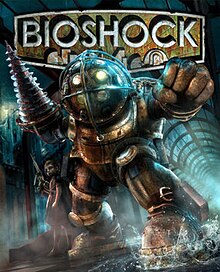
Back BioShock Afrikaans بايوشوك Arabic بيوشوك ARZ BioShock Azerbaijani BioShock Byelorussian BioShock Catalan بایۆشۆک CKB BioShock Czech BioShock Danish BioShock German
| BioShock | |
|---|---|
 | |
| Developer(s) | |
| Publisher(s) | 2K |
| Director(s) | Ken Levine |
| Designer(s) | Paul Hellquist |
| Programmer(s) |
|
| Artist(s) | Scott Sinclair |
| Writer(s) | Ken Levine |
| Composer(s) | Garry Schyman |
| Series | BioShock |
| Engine | Unreal Engine 2.5[4] |
| Platform(s) | |
| Release | |
| Genre(s) | First-person shooter |
| Mode(s) | Single-player |
BioShock is a 2007 first-person shooter game developed by 2K Boston (later Irrational Games) and 2K Australia, and published by 2K. The first game in the BioShock series, it was released for Microsoft Windows and Xbox 360 platforms in August 2007; a PlayStation 3 port by Irrational, 2K Marin, 2K Australia and Digital Extremes was released in October 2008. The game follows player character Jack, who discovers the underwater city of Rapture, built by business magnate Andrew Ryan to be an isolated utopia. The discovery of ADAM, a genetic material which grants superhuman powers, initiated the city's turbulent decline. Jack attempts to escape Rapture, fighting its mutated and mechanical denizens, while engaging with the few sane survivors left and learning of the city's past. The player can defeat foes in several ways by using weapons, utilizing plasmids that give unique powers, and by turning Rapture's defenses against them.
BioShock's concept was developed by Irrational's creative lead, Ken Levine, and incorporates ideas by 20th century dystopian and utopian thinkers such as Ayn Rand, George Orwell, and Aldous Huxley, as well as historical figures such as John D. Rockefeller Jr. and Walt Disney. The game includes role-playing elements, giving the player different approaches in engaging enemies such as by stealth, as well as moral choices of saving or killing characters. Additionally, the game borrows concepts from the survival horror genre, notably the Resident Evil series. BioShock is considered a spiritual successor to the System Shock series, on which many of Irrational's team, including Levine, had worked previously.
BioShock received universal acclaim and was particularly praised by critics for its narrative, themes, visual design, setting, and gameplay. It is considered to be one of the greatest video games ever made and a demonstration of video games as an art form. BioShock was followed by two sequels, BioShock 2 and BioShock Infinite, released in 2010 and 2013, respectively. Ports of BioShock were released for macOS and mobile following its console releases. A remastered version of the game was released on Microsoft Windows, PlayStation 4, Xbox One, and Nintendo Switch as part of BioShock: The Collection.
- ^ Kozanecki, James (November 11, 2007). "AU Shippin' Out August 20–24: BioShock, GRAW 2". GameSpot. Archived from the original on March 6, 2017. Retrieved March 6, 2017.
- ^ a b "BioShock Demo Now Available on Xbox LIVE". IGN. August 13, 2007. Archived from the original on July 13, 2011. Retrieved October 15, 2007.
- ^ "2K Games Injects PlayStation 3 System Owners with Genetically Enhanced Version of BioShock" (Press release). Take-Two Interactive. May 28, 2008. Archived from the original on July 1, 2010. Retrieved August 26, 2010.
- ^ Grant, Christopher (November 3, 2010). "BioShock Infinite is to Unreal Engine 3 as BioShock was to Unreal Engine 2.5". Joystiq. Archived from the original on November 6, 2010. Retrieved August 23, 2011.
Despite an aging engine under the hood, the artists at Irrational were able to make BioShock look more UE3 than UE2.5.
Cite error: There are <ref group=lower-alpha> tags or {{efn}} templates on this page, but the references will not show without a {{reflist|group=lower-alpha}} template or {{notelist}} template (see the help page).